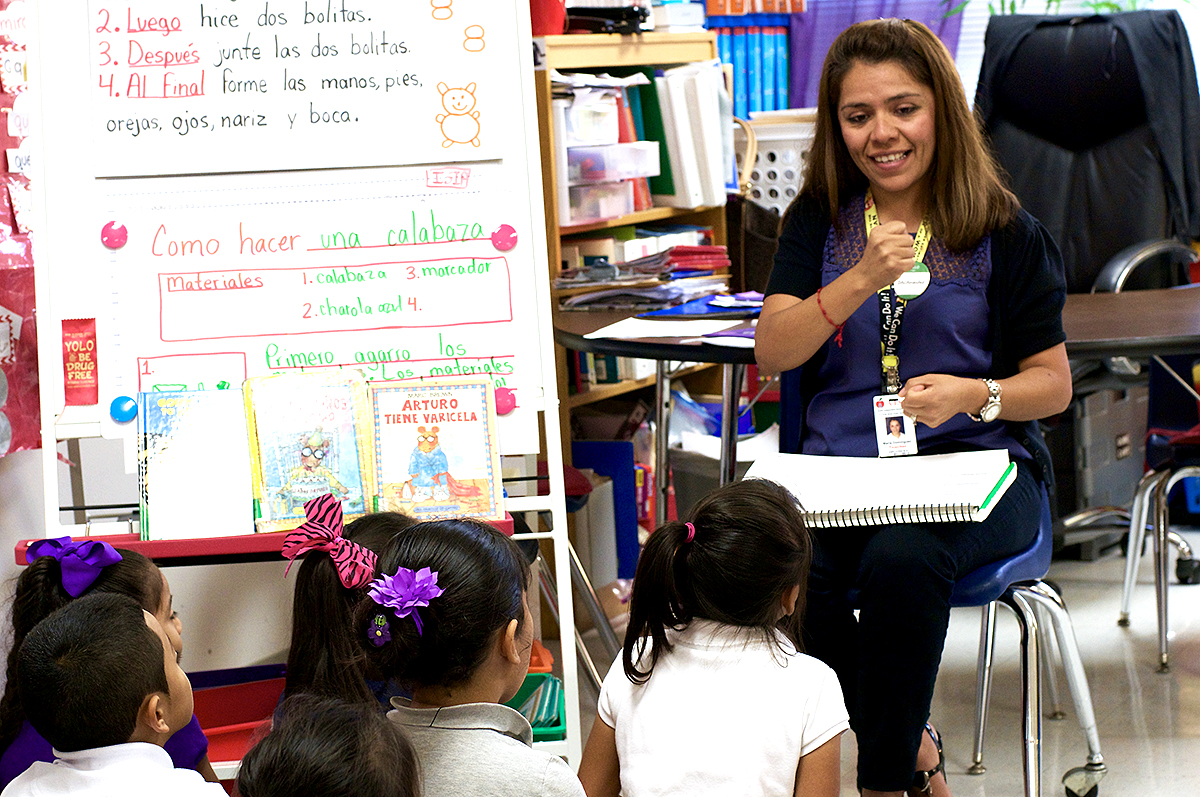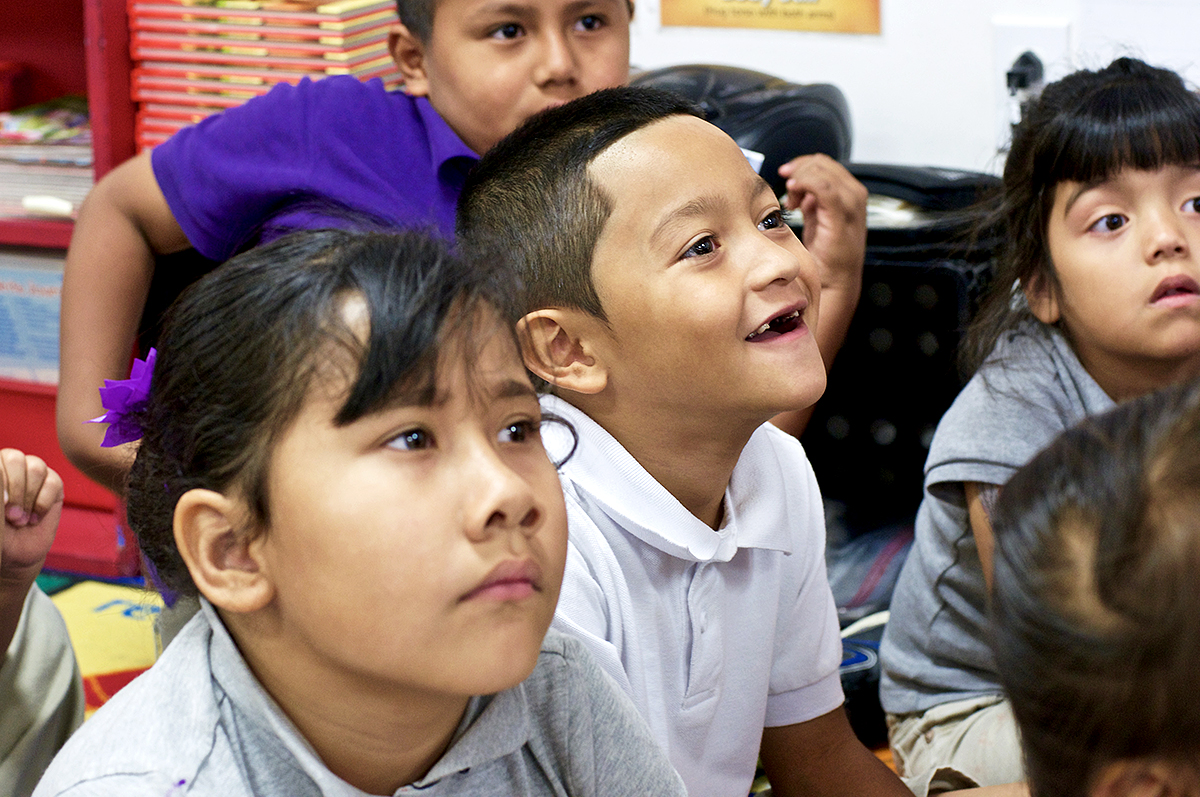Ending Obama Immigration Program Could Affect Texas Classrooms
By Lynda Gonzalez
Reporting Texas

Maria Dominguez a first-grade teacher at Rodriguez Elementary School in Austin, said sharing her undocumented status helps build trust with her students. Benita Ozoude/Reporting Texas
For Reporting Texas
For Alexis Torres, a lot is a stake with the outcome of the presidential election. If Hillary Clinton wins, he will be able to remain in the U.S. and keep teaching at a Houston-area middle school.
If Donald Trump wins, he could be quickly out of a job and face the prospect of being sent back to Mexico, where he has not lived since he was 5. The loss also would be felt at his school, where he serves as a role model and advocates for immigrant students.
Torres, 23, is one of 728,000 undocumented immigrants covered under the Deferred Action for Childhood Immigrants, a program President Obama created in 2012 by executive order. It gives undocumented immigrants who came here as children a temporary stay from the threat of deportation and legal authorization to work.
Clinton has promised to expand the program if she wins. Trump has said he would end it on his first day in office, and that he would move quickly to deport the 11 million undocumented immigrants in the country.
The impact of terminating DACA would be felt across a variety of fields. It could have an impact on Texas schools that face a growing need for bilingual teachers and as the Latino immigrant population grows in urban areas.
Nearly 60 percent of students in the Spring Branch Independent School District, where Torres teaches history, are Hispanic, according to the district’s website.
Torres said he’s one of the few teachers who speaks Spanish at his school, where 44 percent of students have limited English proficiency, as reported by the Texas Education Agency.

Dominguez was recruited into teaching by Teach For America, a nonprofit that enlists college students to teach in l0w-inc0me areas. Benita Ozoude/Reporting Texas
Most districts don’t ask the source of a teacher’s work authorization, so there are no statistics on how many DACA recipients are teachers. Teach For America, a national nonprofit that enlists college students to teach in low-income areas, includes DACA recipients in its recruiting. Torres is one of 52 Teach For America DACA corps members, as they are called, in Texas, and has been public about his immigration status. Twenty-two are in Dallas, the most in any region.
“Any DACAmented teacher or pretty much anyone with a diverse background is an invaluable asset to their school,” said Torres said, using the shorthand for people who have received DACA status. “If DACAmented teachers were to just suddenly disappear, advocates would go away from schools.”
Trump is far from the only critic of DACA. As his last act as state attorney general, Texas Gov. Greg Abbott joined his counterparts in 25 other states in a lawsuit against the federal government challenging President Obama’s plans to expand DACA and implement a similar order for the parents of undocumented children.
Abbott has maintained that the executive order is unconstitutional, promotes illegal immigration and subverts state sovereignty.
A split Supreme Court decision this past summer upheld the Fifth U.S. Circuit Court of Appeals injunction of the expansion.
Alexis was just 5 when his family moved to San Diego from the Mexican state of Baja California. He said his experience as an undocumented immigrant helps him understand the resources his undocumented students need. That includes DACA clinics where local immigration advocates, lawyers or teachers explain the application requirements to immigrant families.
“That’s something I don’t think a regular teacher would actively be watching out for, and students would miss out on that opportunity,” he said.
Viridiana Carrizales, the director of DACA corps member support at TFA, said corps members often teach in areas with high numbers of undocumented students. Carrizales said it’s important for undocumented young people to see adults like themselves in professional positions.
“It was hard for me to have goals and dreams and to even picture what I could be, because I couldn’t see myself in anyone else,” said Carrizales, who is undocumented. “And now, just the thought of teachers who are in front of kids, changing those narratives – it’s just different, and it’s more meaningful for our students.”
There aren’t any numbers for how many DACA recipients work in education outside of Teach For America; most districts don’t ask the source of an applicant’s federal authorization to work. But Torres said that those who disclose their DACA status increase their impact in their schools and communities.
“That’s really powerful, because when you can see someone in a position of power and in a position that, for the most part, is still widely respected, that represents to students,” he said. “They might not understand the complexity of your situation, but they now know there’s a seed planted in their head that this person did it with this obstacle of not having documents, and that means [they] can do it too.”
Maria Dominguez, a first-grade bilingual teacher in the Austin Independent School District, said that sharing her status has helped build trust with her undocumented immigrant students and their families. She works with Education Austin, a labor union for Austin ISD employees, to lead DACA forums and application clinics.
“Understanding the fears that some of our students have right now, especially with what’s going on with the presidential election, has really benefited the way I connect with my students,” she said. “Families or parents of my kids feel comfortable talking to me about their situation, because I think they have that sense of understanding coming from a teacher.”
DACA teachers also expand the pool of bilingual teachers in areas where there is a shortage. The Austin district, for example, has recruited teachers from Spain to help address its needs.
Though the numbers of DACA teachers in Texas and the country aren’t currently tracked, Carrizales said the impact of just one DACA recipient teacher affects many because that one teacher might have up to 100 students. That affects 100 families, she said.
“Whatever the number may be, I know that all of them are making a big impact in their community, and we need to make sure they have the ability to continue to do that,” Carrizales said. “Every student that we teach matters. Therefore, every DACAmented teacher we have matters.”